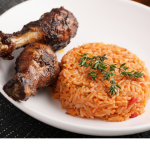Jollof rice is a typical and sensational West African delicacy for Ghana, Nigeria, Cameroon, Senegal, and other African countries. There have been arguments about which of these African countries makes the best jollof rice. But, we acknowledge Nigerian jollof rice as one of the best and most sought-after West African dishes, as it has become a famous dish across all other countries.
Nigerian jollof rice, savory, rich in nutrients and a dopamine-pleasing delicacy with a history of making the recipients of its delicious taste forget their names and date of birth for a moment.
The uniqueness of Nigerian jollof rice is characterized by its special and systematic cooking method, the high-end ingredients used in the preparation process, its spiciness, in-depth richness, and pleasing appearance. Keep reading, and you’ll find out about all of these.
Table of Contents
List of Ingredients for Nigerian Jollof Rice
Doff cap for Nigerians when it comes to Nigerian jollof rice. While shopping for high-end ingredients before making a top-tier Nigerian jollof rice, they do not manage resources. Although the ingredients needed in making jollof rice are pretty essential and are the easiest to get.
Below are the necessary and quality ingredients you need to prepare a sumptuous Nigerian jollof rice;
• The first and main ingredient is rice (preferably long-grained rice.)
• Next, you’ll need canned or sachet tomato (any one of your choosing), fresh tomatoes, Cayenne pepper, bell peppers, scotch bonnet, onions, garlic, and ginger( can be either powder or fresh ones).
• Vegetable oil for frying your sauce (the blended combination of the above Ingredients).
• Stock (Chicken, beef, or any meat) for an additional savory taste. Remember, the water used in boiling is the stock and is very important in making an excellent jollof dish.
• Your choice of vegetables, i.e., carrots, green beans, sweet peas, sweet corn, diced beef, or chunks of meats — all these can be included to suit your preference as they are not necessary.
• Lastly, the seasoning cubes, curry powder, thyme, salt, black/white pepper, and bay leaves (for preservation).
Read also: Nigerian Food Recipes You Must Know Before you are 25.
How to Cook Nigerian Jollof Rice
Preparing Nigerian jollof rice requires a systematic process. Pouring in all the ingredients at once will leave you with a jollof rice that looks like a native doctor’s concoction.
To avoid an outcome like this that might leave you teary, below are the detailed steps on how to cook Nigerian jollof rice;
a. Boil your meat first, i.e., chicken, beef, mutton, or fish. Add in your chopped onions, curry powder, and thyme and boil till it is well cooked, then separate the stock from the meats.
b. Use enough vegetable oil to fry the meat or fish.
c. Next, take the peppers, tomatoes, onions, fresh garlic, and ginger first and blend them all together.
d. In a big pot, add some quantity of oil, preferably the one used in frying the meats, add in the sliced onions and the tomato paste and let it fry, after which you add in the blended pepper mix, add a little bit of water or the stock to ensure that the sauce is cooked correctly. Let the sauce sit for 8 to 10 minutes until the oil floats atop.
e. Pour in your thoroughly washed rice, mix well with the sauce, and add in the stock left and a little water if necessary, just enough water to cook the rice properly. Drop in your bay leaves and allow to cook for 10 to 15 minutes.
Read also: Nigeria Soul Food and Their Importance to The Society.
f. Check back, taste to check the texture, and cover with foil paper to trap in steam. You can also add your lightly steamed or fried vegetables at this point.
g. After fifteen minutes, top your already eye-catching and mouth-watering jollof rice with sliced onions and a little quantity of cooking butter or margarine, allow to steam for a few minutes, stir properly, serve, and enjoy with a good portion of meat or fish.
Sticking to this detailed step-by-step process will ensure you end up with a jollof rice so sensational even the most incredible chef in the world will be wowed!
Also, there are some other varieties of jollof rice, such as the party jollof with its smoky scent and taste of an almost burnt food, native jollof rice, coconut jollof rice, beef jollof rice with its richness and abundance of minced meats. These and some other recipes have made Nigerian jollof rice a top-tier delicacy. It is so glaring at this point that the bond between Nigerians and food, especially jollof, is great!
Let me tell you a secret: one of the many reasons people love attending ceremonies, especially wedding parties, is because most parties serve the best Nigerian party Jollof. Oh, you don’t know. Now you do! Make sure to attend a party next time.
You may be an indoor kind of person who doesn’t fancy parties. The good news is you can make Nigerian party jollof rice in the comfort of your abode.
Read also: Owambe Party in Nigeria: Food, Vibes, Dressing and Cruise.
How to Make Nigerian Party Jollof Rice at Home
The process is just like the normal jollof rice; the only difference is allowing the rice to burn. Yes, that seems funny and is a waste of food but guess what? If you want the outcome to be that of the best Nigerian party Jollof, a little portion of the rice is supposed to burn. This burning process will ensure the characteristic smokiness of a Nigerian party jollof rice.
Another interesting angle is that Nigerian jollof rice is consumed almost every day by Nigerians, so much that it seems like a long-life criterion.
Conclusion
The attempts of other African countries with their jollof rice recipes to take over the leading position of the Nigerian jollof rice in the wide world of food recipes have proved futile. Nigerian jollof still stands as strong like the wall of Jericho winning against all odds, refusing to budge from its number one position.
Oluwanifemi Akintomide edited this piece.
Did you find this useful? Let’s know your thoughts in the comment section, or speak to us on WhatsApp. If you’d love more exciting and valuable posts on Nigerian lifestyle, our newsletter is one you shouldn’t miss. Subscribe here.
About Author
- Lawal Jesutofunmi Mary is a Skin care expert, hair care consultant and content writer communicating helpful information on hair and skin care through writing. She is an avid reader who loves to broaden her horizons through reading. Writing reviews of books on personal growth and self development gives her joy.





